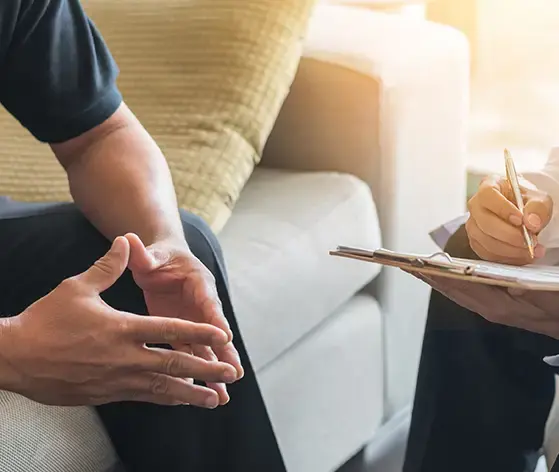The good news is insomnia is treatable and a good night’s sleep is possible. Recognising that there is a problem is the first step on the path towards better sleep.
It’s time to make friends with sleep again!

Insomnia is treated in different ways depending on the type, the cause and the severity.
Everyone is different so it can take time and a little bit of patience to find what works for you. Some people find setting good sleep habits enable them to get the quality sleep they need so they feel energised and ready to face the day. Others use relaxation or home remedies to manage insomnia symptoms. But if you’re at your wits end you may need some extra help from a sleep therapist.
As a first step towards resolving your insomnia, sleep experts recommend adopting habits that can help you get a good night’s sleep. They call this ‘sleep hygiene’1. Over the years, you may have adopted bad habits that are now making it more difficult for you to sleep well. Good habits to make include:

This begins with getting up at the same time every day. Do this regularly and you should find that you’re feeling sleepy at the same time every night. Go out in the sun in the early morning. The morning light will also help to set your body clock.

Listen to your body when it tells you it’s time to sleep. Sleepiness is your cue to get ready for your night’s sleep. But don’t try and sleep if you’re not feeling tired. You’ll sleep better if you wait until you feel sleepy before heading for bed.

Invest in a good mattress that feels comfortable. Sleep at the right temperature. Your room and bedding should be not too hot or too cold. A dark, quiet environment makes it easier to get a good night’s sleep.

Try wearing earplugs if noise is bothering you or get a white noise machine. Make sure the room is dark, using block-out window furnishings if necessary.

Your bedroom is a sanctuary. Use it only for sleeping and sex. So that your mind associates your bedroom with sleep, don’t watch TV, use your phone, do work or play with electronic equipment.

While these substances may make you feel relaxed, tobacco is actually a stimulant and alcohol can disrupt your natural sleep cycles. It can also result in frequent waking for bathroom visits.

Relaxation exercises before bed can help you wind down so you’re ready to fall asleep. Mindfulness meditation is a technique that has a number of health benefits including relieving stress, boosting immunity and improving concentration.2

Get up, leave the room and find a relaxing activity such as reading or listening to music. Don’t use any screens for entertainment as the blue light they give off can interfere with your body’s clock.3
When you feel sleepy, go back to bed and try again to sleep.

Insomnia is one of the most common complaints people talk to their doctors about.
To diagnose insomnia, your doctor will ask you a number of questions to determine the severity and type of insomnia you’re experiencing.10 The doctor may ask you about things like snoring, any recent weight gain, your current stress level and mood. These can all play a role in reducing your ability to sleep soundly.
Several medical tests may be needed so your doctor can pinpoint the cause of your insomnia.

Cognitive behavioural therapy6 (or CBT-i) is an insomnia treatment which has proven to be effective in the long term, especially if there’s no identifiable medical cause for your insomnia.7
The role of CBT-i is to change the way you think about your sleep problem.8 If you can replace negative thoughts about your sleep with more positive ones, it can ‘reframe the brain’ with the result that you find it easier to fall asleep and go back to sleep if you wake in the night. CBT-i insomnia treatment is offered by psychologists and you may need 4 to 6 sessions to make a good impact. There’s also homework to do between sessions which is essential to the process.9

Source: www.betterhealth.vic.gov.au/health/conditionsandtreatments/sleep-hygiene accessed 6 June 2019
Source: https://www.apa.org/monitor/2012/07-08/ce-corner accessed 6 June 2019
Source: https://www.health.harvard.edu/staying-healthy/blue-light-has-a-dark-side accessed 6 June 2019
Source: https://www.healthline.com/health/healthy-sleep/insomnia-home-remedies#magnesium accessed 6 June
2019
Source: https://www.healthline.com/nutrition/sleep-aids#section2 accessed 6 June 2019
Source: https://www.health.harvard.edu/staying-healthy/too-early-to-get-up-too-late-to-get-back-to-sleep accessed
6 June 2019
Source:https://www.webmd.com/sleep-disorders/news/20040927/short-insomnia-therapy-beats-sleeping-pills#1 accessed 2 August 2019
Source: Pidgeon WR. J Clin Psychol. 2010 Nov; 66(11): 1148–1160
Source: Matthews EE et al. Sleep Med Rev. 2013 Dec; 17(6): 10.1016
Source: https://www.webmd.com/sleep-disorders/diagnosing-insomnia accessed 6 June 2019